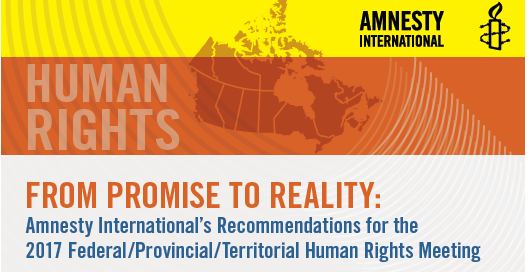The upcoming ministerial meeting on human rights demonstrates that federal, provincial and territorial governments in Canada recognize that more must be done to fulfill Canada’s domestic and international commitments to recognize, respect and fulfill human rights. As a concrete and meaningful way to better address this need, our organizations are calling on the federal, provincial and territorial governments to work collaboratively with First Nations, Inuit and Métis peoples as well as with African Canadians and other communities of colour, and engage with civil society to undertake a formal and systematic review of the most recent United Nations treaty body report on Canada.
In August, the UN Committee on the Elimination of Racial Discrimination (CERD) – the independent, expert body that oversees state compliance with the international human rights treaty of the same name – set out more than 60 detailed, concrete recommendations for governments in Canada. The Committee’s recommendations addressed some of the most pressing human rights concerns in Canada including respect for the land rights of Indigenous peoples and Indigenous peoples’ right of free, prior and informed consent; violence against Indigenous women and girls; over-incarceration of Indigenous persons, people of African descent and members of other racialized groups; discrimination against African Canadians in education and employment; racial profiling of African Canadians by police services and correctional officers; and unequal access to government services including the need to comply with four legal orders to cease discrimination in the provision of First Nations children’s services. The Committee also addressed the need for Canada to prepare and implement a programme of measures and policies in light of the International Decade for People of African Descent and requested that Canada develop and launch a new national action plan against racism. The Committee’s findings and recommendations implicate all levels of government and some included requirements for further reporting to the UN on Canada’s compliance.
Such treaty body reviews are a crucial part of the international system of human rights protection. Through such reviews, states can be held more accountable to the public, to Indigenous peoples and to the international community. The expert findings and recommendations by these independent committees provide a roadmap of the most urgent and pressing measures needed to bring government policies and programmes into line with their international human rights obligations. All states, regardless of the strength of their domestic human rights system, benefit from the review process which has the advantage of both impartiality and experience in considering the policies and programmes of states around the world.
Indigenous peoples’ organizations, groups representing communities of colour and other civil society groups in Canada take such reviews very seriously. The CERD review of Canada received more than 40 submissions from organizations representing Indigenous peoples, African Canadians and other communities of colour and civil society. More than 20 Indigenous Nations, Indigenous peoples’ organizations, groups representing African Canadians and other communities of colour and civil society groups – including many of the signatories of this letter – sent representatives to Geneva to make presentations during the review.
In the past, Canada’s engagement with treaty body reviews has been incomplete and inadequate. While the federal, provincial and territorial governments have collaborated to make detailed submissions to the review processes, and have sent sizable delegations to the review sessions, there has been little or no follow up on the findings and recommendations that are made. This does not do justice to the time and effort Indigenous peoples, African Canadians and other communities of colour and civil society make to engage in the review process and represents a lost opportunity both to improve Canada’s own human rights record and strengthen the international human rights system by setting a positive example of implementation and reconciliation.
We therefore urge federal, provincial and territorial Ministers who are responsible for human rights across Canada to embark on a new and more positive course of action by committing to undertake a formal review of the findings and recommendations of CERD’s August 2017 Concluding Observations on Canada and to do so in collaborative and transparent manner, working in partnership with Indigenous peoples, African Canadians and other communities of colour, and civil society, and making the outcomes available to the public and to CERD itself.
Endorsed by:
Aboriginal Legal Services
African Canadian Legal Clinic
Amnesty International Canada
Canada Without Poverty
Canadian Friends Service Committee
Canadian HIV/AIDS Legal Network
Chinese and Southeast Asian Legal Clinic
Colour of Poverty Colour of Change
Confederacy of Treaty 6
First Nations Child and Family Caring Society
First Nations Summit
Grand Council of the Crees (Eeyou Istchee)
KAIROS
National Aboriginal Circle Against Family Violence
Ontario Council of Agencies Serving Immigrants
South Asian Legal Clinic of Ontario
Union of BC Indian Chiefs













